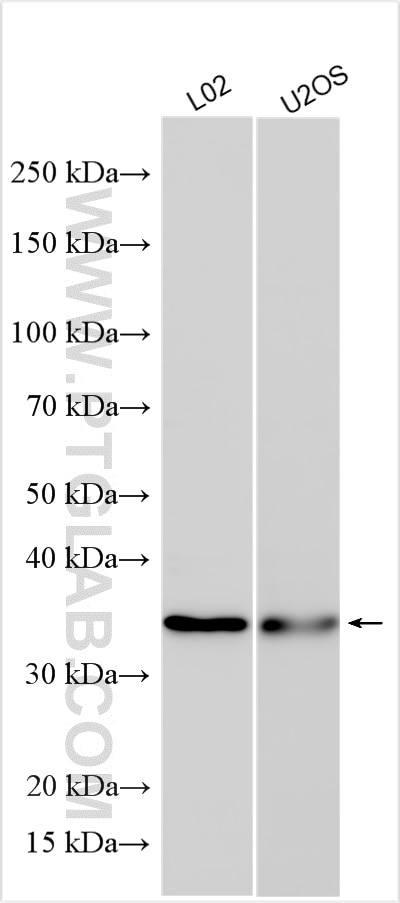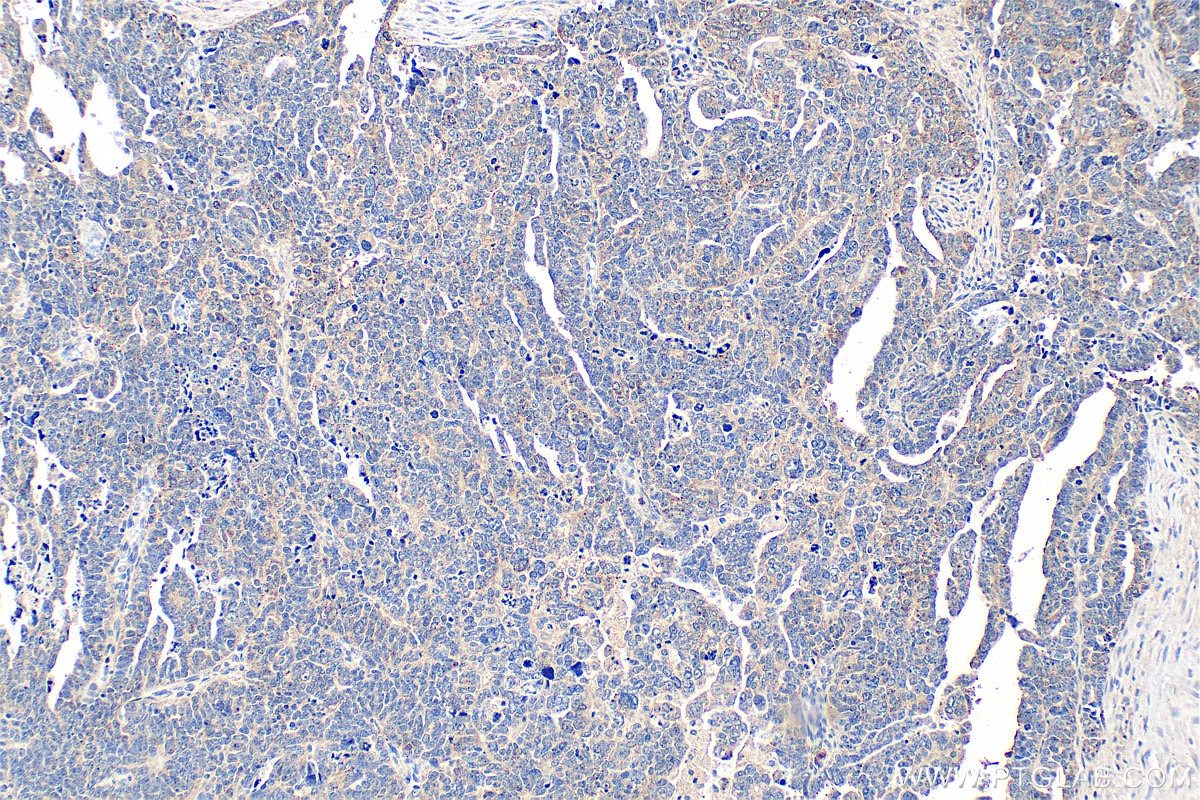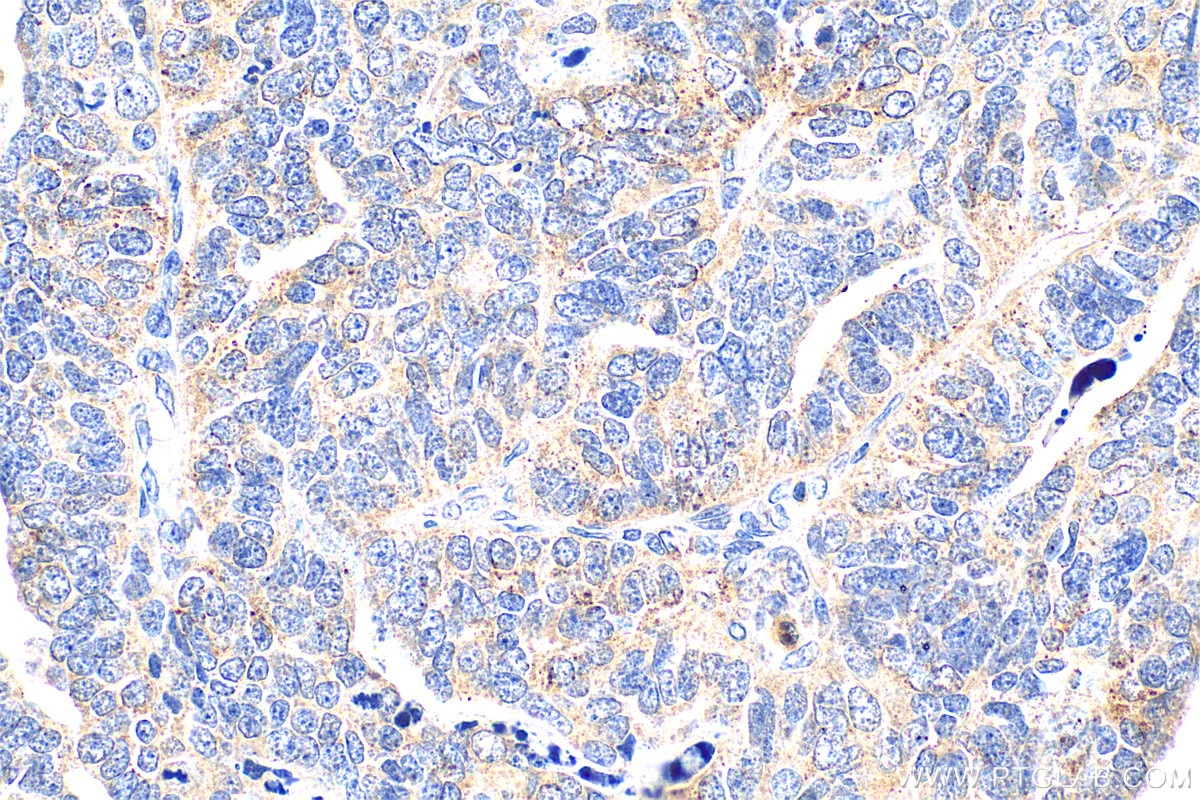- Phare
- Validé par KD/KO
Anticorps Polyclonal de lapin anti-PMEPA1
PMEPA1 Polyclonal Antibody for WB, IHC, ELISA
Hôte / Isotype
Lapin / IgG
Réactivité testée
Humain, rat, souris
Applications
WB, IHC, IF, ELISA
Conjugaison
Non conjugué
N° de cat : 16521-1-AP
Synonymes
Galerie de données de validation
Applications testées
| Résultats positifs en WB | cellules L02, cellules U2OS |
| Résultats positifs en IHC | tissu de tumeur ovarienne humain, il est suggéré de démasquer l'antigène avec un tampon de TE buffer pH 9.0; (*) À défaut, 'le démasquage de l'antigène peut être 'effectué avec un tampon citrate pH 6,0. |
Dilution recommandée
| Application | Dilution |
|---|---|
| Western Blot (WB) | WB : 1:500-1:2000 |
| Immunohistochimie (IHC) | IHC : 1:200-1:800 |
| It is recommended that this reagent should be titrated in each testing system to obtain optimal results. | |
| Sample-dependent, check data in validation data gallery | |
Applications publiées
| KD/KO | See 4 publications below |
| WB | See 8 publications below |
| IHC | See 3 publications below |
| IF | See 2 publications below |
Informations sur le produit
16521-1-AP cible PMEPA1 dans les applications de WB, IHC, IF, ELISA et montre une réactivité avec des échantillons Humain, rat, souris
| Réactivité | Humain, rat, souris |
| Réactivité citée | Humain, souris |
| Hôte / Isotype | Lapin / IgG |
| Clonalité | Polyclonal |
| Type | Anticorps |
| Immunogène | PMEPA1 Protéine recombinante Ag9744 |
| Nom complet | prostate transmembrane protein, androgen induced 1 |
| Masse moléculaire calculée | 287 aa, 32 kDa |
| Poids moléculaire observé | 32-36 kDa |
| Numéro d’acquisition GenBank | BC015918 |
| Symbole du gène | PMEPA1 |
| Identification du gène (NCBI) | 56937 |
| Conjugaison | Non conjugué |
| Forme | Liquide |
| Méthode de purification | Purification par affinité contre l'antigène |
| Tampon de stockage | PBS with 0.02% sodium azide and 50% glycerol |
| Conditions de stockage | Stocker à -20°C. Stable pendant un an après l'expédition. L'aliquotage n'est pas nécessaire pour le stockage à -20oC Les 20ul contiennent 0,1% de BSA. |
Informations générales
PMEPA1, also known as TMEPAI, was first discovered as androgen inducible gene in hormone responsive LNCaP cells. PMEPA1 is highly expressed in various solid tumors and is known to play important roles in the transforming growth factor-β(TGF-β) signaling pathway (PMID: 27697531).
Protocole
| Product Specific Protocols | |
|---|---|
| WB protocol for PMEPA1 antibody 16521-1-AP | Download protocol |
| IHC protocol for PMEPA1 antibody 16521-1-AP | Download protocol |
| Standard Protocols | |
|---|---|
| Click here to view our Standard Protocols |
Publications
| Species | Application | Title |
|---|---|---|
EMBO Mol Med An autocrine ActivinB mechanism drives TGFβ/Activin signaling in Group 3 medulloblastoma. | ||
Int J Biol Sci METTL16 suppressed the proliferation and cisplatin-chemoresistance of bladder cancer by degrading PMEPA1 mRNA in a m6A manner through autophagy pathway | ||
Front Immunol PMEPA1 Is a Prognostic Biomarker That Correlates With Cell Malignancy and the Tumor Microenvironment in Bladder Cancer
| ||
FASEB J PMEPA1 and NEDD4 control the proton production of osteoclasts by regulating vesicular trafficking.
| ||
J Virol NF-κB-Interacting Long Noncoding RNA Regulates HIV-1 Replication and Latency by Repressing NF-κB Signaling. | ||
Biochem Biophys Res Commun PMEPA1, a TGF-β- and hypoxia-inducible gene that participates in hypoxic gene expression networks in solid tumors.
|




